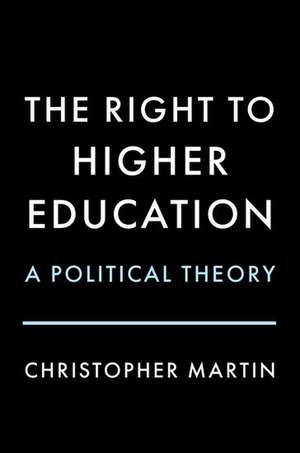The Right to Higher Education: A Political Theory
Autor Christopher Martinen Limba Engleză Hardback – 27 apr 2022
Preț: 411.89 lei
Preț vechi: 484.58 lei
-15% Nou
Puncte Express: 618
Preț estimativ în valută:
78.84€ • 85.67$ • 66.27£
78.84€ • 85.67$ • 66.27£
Carte disponibilă
Livrare economică 31 martie-14 aprilie
Livrare express 15-21 martie pentru 28.54 lei
Preluare comenzi: 021 569.72.76
Specificații
ISBN-13: 9780197612910
ISBN-10: 0197612911
Pagini: 272
Dimensiuni: 218 x 147 x 25 mm
Greutate: 0.43 kg
Editura: Oxford University Press
Colecția OUP USA
Locul publicării:New York, United States
ISBN-10: 0197612911
Pagini: 272
Dimensiuni: 218 x 147 x 25 mm
Greutate: 0.43 kg
Editura: Oxford University Press
Colecția OUP USA
Locul publicării:New York, United States
Recenzii
Martin's carefully argued book is a welcome contribution to helping us reimagine the place of higher education in an increasingly unequal and fractured world.
Martin's The Right to Higher Education is sure to become a touchstone text in higher education research. Though many theorists and advocates increasingly support thinking of higher education as a right, few offer arguments for this claim. Martin's careful, tightly argued book does just that. But perhaps the most significant contribution this book makes is shifting the debate in higher education away from inequality and economic mobility. Instead, Martin asks us to consider what role higher education should play in our lives.
In this remarkable book, Christopher Martin argues that there is a robust, universal right to higher education and that vindicating this right requires reimagining the role of higher education in our lives. Drawing expertly on the tradition of perfectionist liberalism, Martin makes the case that the state has the authority-and the duty-to arrange higher educational institutions in a way that guarantees, to each citizen, the opportunity to live autonomously over the full course of a life. Few readers will come away unmoved by this inspiring vision of the place of higher education in a free society.
Christopher Martin's book provides an original and comprehensive justification of higher education, which shapes a compelling vision of what universities and colleges should be doing. A major contribution to the philosophy of education, that should be read not just by philosophers, but by higher education teachers and leaders.
Martin's political theory of higher education introduces significant aspects that the ongoing conversations have largely overlooked. Recommended. Graduate students; faculty; general readers.
Martin offers a highly refreshing, deeply insightful, and seriously argued book that provokes serious thinking, demanding a critical reflection on the public policy approach to higher education.
The book is indeed a very significant contribution to the discourses on the nature of higher education and its relationship to state and society.
Martin's The Right to Higher Education is sure to become a touchstone text in higher education research. Though many theorists and advocates increasingly support thinking of higher education as a right, few offer arguments for this claim. Martin's careful, tightly argued book does just that. But perhaps the most significant contribution this book makes is shifting the debate in higher education away from inequality and economic mobility. Instead, Martin asks us to consider what role higher education should play in our lives.
In this remarkable book, Christopher Martin argues that there is a robust, universal right to higher education and that vindicating this right requires reimagining the role of higher education in our lives. Drawing expertly on the tradition of perfectionist liberalism, Martin makes the case that the state has the authority-and the duty-to arrange higher educational institutions in a way that guarantees, to each citizen, the opportunity to live autonomously over the full course of a life. Few readers will come away unmoved by this inspiring vision of the place of higher education in a free society.
Christopher Martin's book provides an original and comprehensive justification of higher education, which shapes a compelling vision of what universities and colleges should be doing. A major contribution to the philosophy of education, that should be read not just by philosophers, but by higher education teachers and leaders.
Martin's political theory of higher education introduces significant aspects that the ongoing conversations have largely overlooked. Recommended. Graduate students; faculty; general readers.
Martin offers a highly refreshing, deeply insightful, and seriously argued book that provokes serious thinking, demanding a critical reflection on the public policy approach to higher education.
The book is indeed a very significant contribution to the discourses on the nature of higher education and its relationship to state and society.
Notă biografică
Christopher Martin is Associate Professor in the Faculty of Education and Associate Member of the Department of Economics, Philosophy, and Political Science at The University of British Columbia. He is the author of Education in a Post-Metaphysical World (Bloomsbury Press, 2012), R.S. Peters (Bloomsbury Press, 2014; with Stefaan Cuypers), and Questioning the Classroom (Oxford University Press, 2016; with Dianne Gereluk, Bruce Maxwell, and Trevor Norris). His research areas include political philosophy and the philosophy of education.
